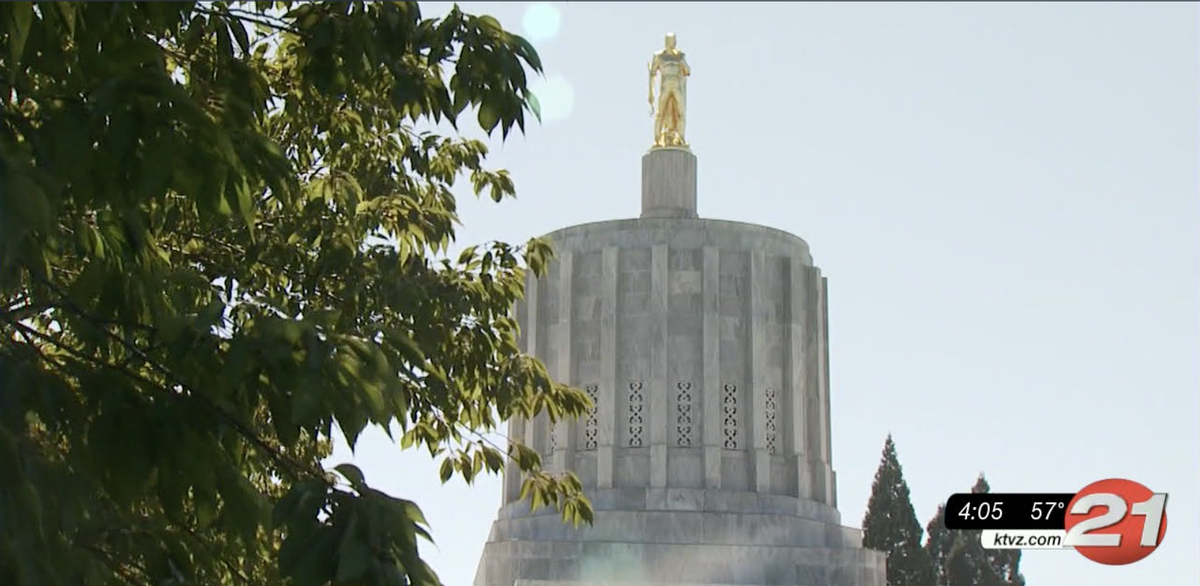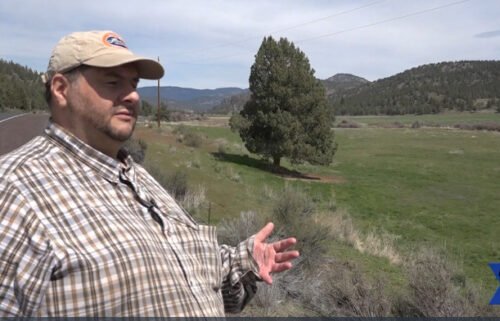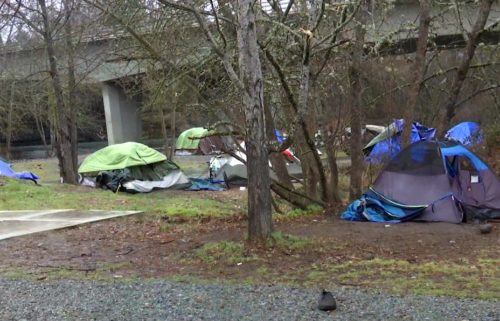Democratic lawmakers propose $100M for rural GOP districts; $100M climate package also in works

SALEM, Ore. (AP) — Democrats who control the Oregon Legislature are proposing to give Republicans $100 million to spend essentially as they see fit in their rural Oregon districts.
With two weeks to go in the special session, the money would give the Republican minority more control as Democrats seeks to put an unexpected revenue windfall toward priorities such as housing, climate change, mental health and job training, Oregon Public Broadcasting reported Monday.
The offer could help ease growing tension between the parties as they hash out what to do with the more than $2.5 billion revenue that wasn’t taken into account when the state budget was passed last year.
Meanwhile, legislative leaders also released initial details Monday of a same-sized, $100 million "Climate Resilience Budget" to address "urgent environmental priorities."
House Speaker Dan Rayfield, D-Corvallis, alerted Republican leaders last week that Democrats were prepared to cede some of the money to GOP priorities.
“I’ve seen both parties be pretty contentious with one another,” state Rep. Greg Smith, R-Heppner, one of four lawmakers tasked with creating a plan for the money, told OPB. “I believe the speaker of the House is saying, ‘Let’s see if there’s a better approach to public policy, one where we can all communicate together.’ It’s refreshing.”
Smith said his fellow Republicans at first suspected the proposal was a Democratic ploy. The party is still furious that former House Speaker Tina Kotek, D-Portland, broke a deal to grant Republicans an equal say on new congressional maps last year.
“Initially, there was a perception that this was some sort of buy-off,” Smith said of a meeting last week in which House and Senate Republicans discussed the idea. “After initial conversations and once folks had a chance to better understand what this approach was about, I think more folks came along.”
GOP members and one rural Democrat have made a list of the highest-priority projects in their districts stretching from Eastern Oregon to the coast. Smith, for instance, said he would request $1 million to improve each of the seven fairgrounds located in his northeastern Oregon district. A full list of proposed projects had not been released as of Monday morning, OPB reported.
State Sen. Elizabeth Steiner Hayward, D-Portland, one of the state’s top budget writers, said of the package: “We’re all committed to make sure that rural Oregon has the things it needs to progress.”
The proposal is a pragmatic one because the GOP minority has become adept at creating hurdles for the Democratic majority.
Once again this year, Republicans in both chambers are reserving their right to require that bills be read in full before a final vote. That reading requirement is laid out in the state Constitution, but the parties routinely agreed to waive it in the interest of efficiency until it became a popular bargaining chip for Republicans in 2016.
The House hasn’t even attempted a vote to waive the rule this year, meaning each bill is read before a vote, eating up time in a session that must adjourn by March 7.
Two news releases Monday from the Oregon House Speaker and Senate President:
$100 Million Rural Oregon Infrastructure Package Unites Legislature
Bipartisan Investments to Support Local Economies Across the State
SALEM – In a historic marker of bipartisan collaboration, the Oregon Legislature is on track to approve a $100 million investment package to support infrastructure projects and economic development in rural Oregon for many years to come.
A bipartisan, bicameral group of legislators is developing recommendations to address urgent infrastructure and economic development needs facing their communities. The workgroup includes legislators representing the Coast, Mid-Willamette Valley, Central Oregon, Southern Oregon, Eastern Oregon, and Northeastern Oregon. These investments will create jobs across the state while supporting Main Street economies and the small businesses that make up the backbone of Oregon’s economy.
“It’s a good day when Republicans and Democrats can come together for the good of all Oregonians,” said Senate Republican Leader Tim Knopp (R-Bend). “This money will help move forward important public projects throughout Oregon.”
“These will be transformational investments to improve rural communities for generations and create hundreds of good paying jobs,” Rep. David Gomberg (D-Central Coast) said. “As our infrastructure ages, small town are looking at big price tags to replace or repair water and sewer systems, bridges, and public buildings. Now with the state’s help and federal dollars on the way, we can bring lasting change to rural communities across our state.”
House Speaker Dan Rayfield (D-Corvallis) and Senate President Peter Courtney (D-Salem) have prioritized funding for these projects, in addition to investments made in every community across Oregon, including affordable housing, education, behavioral health, and more.
More details of the investment package will be available in the final week of the 2022 legislative session.
$100 Million Climate Resilience Budget Aims to Tackle Drought, Extreme Weather, Infrastructure Needs
SALEM – In response to the intensifying effects of climate change, climate resiliency and environmental justice leaders in the Oregon Legislature announced a $100 million Climate Resilience Budget to support drought-impacted communities, keep vulnerable Oregonians safe from extreme weather events, make infrastructure investments that will reduce carbon emissions and address other urgent environmental priorities.
“Drought, fire and other climate disruptions put the most vulnerable Oregonians at great risk,” said Senator Kate Lieber (D-Beaverton), chair of the Senate Committee on Energy and Environment. “By investing in resilient homes and clean energy, we can build safer and healthier communities, reduce the cost of energy for consumers, and create good-paying jobs.”
Protecting Oregonians from Future Heatwaves: The 2021 extreme heatwave resulted in at least 96 deaths across 28 Oregon cities. Many of those individuals were low-income renters, with most having no access to life-saving cooling devices such as air conditioning or heat pumps in their homes.
The budget responds to the emerging crisis of extreme weather events by supporting the installation of air conditioners, air filters and heat pumps to keep Oregonians cool during the summer months, including seniors and people with disabilities. It also assists local governments in establishing cooling centers, warming centers, and air shelters.
“The deaths we saw last summer made it crystal clear that we have to take immediate action to keep vulnerable Oregonians safe from very real health and safety risks posed by climate change, including extreme heat and smoke events,” said Rep. Pam Marsh (D-Ashland), chair of the House Committee on Environment and Natural Resources. “This 2022 legislative package will help Oregonians stay safe, and it will also continue our ongoing work to reduce the emissions that drive these conditions on the ground.”
Drought Relief: Widespread drought across the state impacts more than 1.8 million Oregonians. This investment package includes additional, targeted funding to make Oregon more resilient to drought conditions. These new funds join $100 million in drought relief passed during the Legislature’s December 2021 special session to aid Oregon’s rural communities severely impacted by drought, heat, or fire.
Improving Home Energy Efficiency: The package includes fresh support for the bipartisan Healthy Homes Repair Fund, helping low-income Oregonians repair and rehabilitate their homes to improve health, safety, and energy efficiency. The program was established by the Legislature in 2021 through House Bill 2842, chief sponsored by Representatives Marsh, Karin Power (D-Milwaukie), and Khanh Pham (D-Portland).
“More support for the successful Healthy Homes program will help low-income Oregonians lower their cost of living by spending less on heating and cooling,” said Rep. Zach Hudson (D-Troutdale), vice chair of the House Committee on Environment and Natural Resources. “This is only part of our ongoing commitment to support a clean energy economy and prioritize the people and communities most affected by the climate crisis.”
Encouraging Solar Energy: The plan invests in solar and storage rebates for low-income Oregon residents and service providers who install solar energy systems in their homes and businesses. The Legislature established the bipartisan Oregon Solar + Storage Rebate Program during the 2019 legislative session (House Bill 2618).
Reducing Emissions: In an attempt to lower transportation emissions – the largest source of emissions in the state – key investments will be made in zero-emission vehicles, including charging networks for medium- and heavy-duty trucks, and new incentives for Oregonians to drive electric vehicles. The Legislature will also establish the Resilient, Efficient Buildings Task Force to reduce emissions from homes and buildings, the second-largest source of climate pollution in the state.
Seismic Upgrades of Oregon’s Fuel Storage: Oregon’s aging fuel storage infrastructure is extremely vulnerable. A major earthquake would result in the critical failure of these storage systems and a major statewide disaster. Additional funding will support seismic planning at oil and liquid fuel terminals.
More details about this funding package will be available during the final week of the 2022 legislative session.



